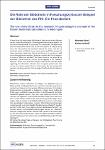Die Rolle der Bibliothek im Forschungszyklus am Beispiel der Bibliothek des RKI. Ein Praxisbericht
Senst, Henriette
Heldt, Katharina
Bibliotheken stehen spätestens seit Beginn der Digitalisierung von Wissenschaft und Gesellschaft unter dem Druck, ihre Services konkurrierend zum Internet und zu sozialen Medien anzubieten. Um diesem Konkurrenzdruck zeitgemäß zu begegnen, müssen heute radikal die Erfahrungen und Bedürfnisse der Nutzer in den Mittelpunkt der Bibliotheksarbeit gestellt werden. Dazu sind zwei Gedanken hilfreich: Wie nehmen uns eigentlich unsere Wissenschaftler wahr? Und: Was brauchen unsere Nutzer wirklich? Die Beantwortung dieser Fragen kann zeigen, dass wir sowohl unser Selbstverständnis als auch unsere Angebote grundlegend überdenken müssen. Bibliotheksdienstleistungen müssen weniger unter dem Aspekt „Was können wir anbieten?“, sondern vermehrt unter dem Fokus „Was brauchen die Wissenschaftler?“ betrachtet werden. Bibliotheksdienstleistungen können am „Research Lifecycle“ ausgerichtet werden. Welche Ziele und welche Anforderungen an die Informationsinfrastruktur haben die Wissenschaftler während dieses Prozesses und wie können wir uns als Bibliothek an dem Prozess beteiligen? Wir betrachten diese Frage am Beispiel der strategischen Ausrichtung der Bibliothek des RKI. At least since the beginning of digitization of science and society libraries are set under the pressure of competing with their services against the internet and social media. To encounter this competition, the experience and the needs of the users must be the central point of today’s library work. For this purpose two questions should be raised: How do our scientists notice us? What do our users really need? The answers to these questions might show that we will have to reconsider our self-concept as well as our services. Library services should not be designed in terms of “What can we offer?” but rather focus on the needs of the scientists. The services of a library can be aligned to the “research lifecycle”. Which aims and which requirements do the scientists have regarding the information infrastructure during this process and how can we as a library support them in this process. We will examine this question using the example of the strategy of the Robert Koch Institute’s library.
No license information

